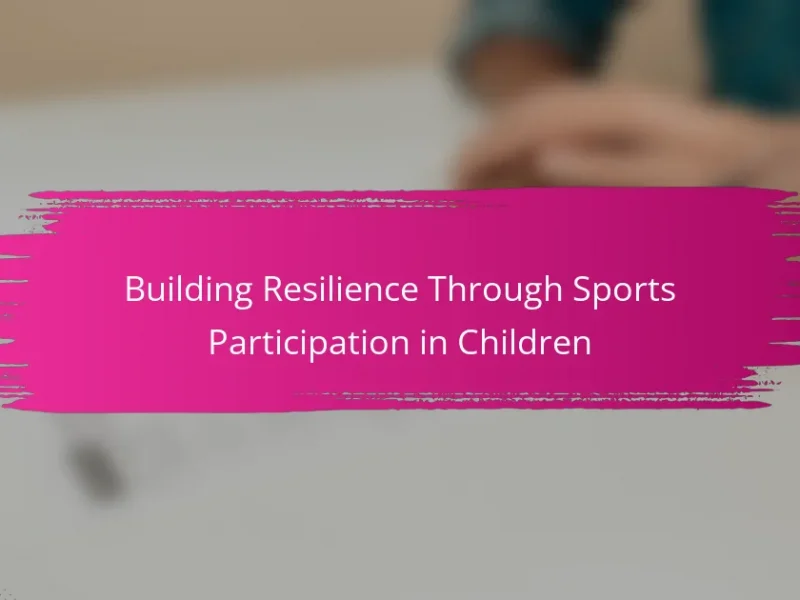Positive coaching strategies enhance child performance by creating a supportive environment. Key principles include building trust, encouraging effort, promoting a growth mindset, and providing constructive feedback. Effective coaching focuses on encouragement, individualized feedback, and resilience training. Rare strategies like fostering intrinsic motivation and utilising strength-based feedback further empower children in their development.

What are the foundational principles of positive coaching strategies?
Positive coaching strategies focus on fostering a supportive environment to enhance child performance. These principles include building trust, encouraging effort, promoting a growth mindset, and providing constructive feedback. Trust allows children to feel safe and open to learning. Encouragement boosts confidence and resilience. A growth mindset helps children understand that abilities can improve with effort. Constructive feedback guides improvement while maintaining motivation. Together, these principles create a positive atmosphere that empowers children to excel.
How does positive reinforcement impact child performance?
Positive reinforcement significantly enhances child performance by increasing motivation and engagement. When children receive positive feedback for their efforts, they are more likely to repeat those behaviours, leading to improved skills and confidence. Research shows that children who experience consistent positive reinforcement exhibit higher levels of academic achievement and social skills. This strategy fosters a growth mindset, encouraging children to embrace challenges and persist in the face of difficulties.
What role does effective communication play in coaching?
Effective communication is crucial in coaching as it fosters trust, clarity, and motivation. Coaches who communicate effectively can convey expectations and provide constructive feedback, enhancing a child’s performance. This interaction promotes a supportive environment, encouraging children to express themselves and engage actively. Moreover, effective communication helps in identifying individual strengths and areas for improvement, allowing tailored coaching strategies that align with each child’s unique attributes. As a result, children feel more confident and are more likely to achieve their goals.
What techniques enhance communication with children?
Positive coaching strategies enhance communication with children by fostering trust and understanding. Techniques include active listening, using positive reinforcement, and modelling appropriate behaviour. Active listening involves giving full attention to the child, ensuring they feel heard. Positive reinforcement encourages desired behaviours through praise or rewards, boosting confidence. Modelling appropriate behaviour sets a standard for children to emulate, promoting effective communication. These strategies create a supportive environment that enhances child performance.
How can coaches build trust with young athletes?
Coaches can build trust with young athletes by fostering open communication and demonstrating genuine care. Establishing a supportive environment encourages athletes to express their thoughts and feelings. Consistent feedback and recognising individual efforts further strengthen this trust. Engaging in team-building activities can also enhance relationships, making athletes feel valued.

What unique attributes distinguish effective positive coaching?
Effective positive coaching is distinguished by its focus on encouragement, individualized feedback, and fostering resilience. These unique attributes enhance a child’s performance by creating a supportive environment that prioritises personal growth. Encouragement boosts self-esteem, while tailored feedback addresses specific needs, promoting skill development. Resilience training helps children overcome challenges, ensuring they remain motivated and engaged.
How can tailored feedback improve a child’s motivation?
Tailored feedback significantly enhances a child’s motivation by providing personalized guidance that acknowledges their unique strengths and areas for improvement. This approach fosters a growth mindset, encouraging children to embrace challenges and persist through difficulties. Research shows that specific, constructive feedback can lead to increased engagement and effort in activities, ultimately boosting performance and self-esteem. By focusing on individual progress rather than comparison to peers, tailored feedback nurtures a positive learning environment, making children feel valued and supported.
What innovative methods are being used in positive coaching?
Innovative methods in positive coaching focus on fostering a supportive environment, enhancing communication, and utilising technology. Coaches employ techniques such as positive reinforcement, goal-setting frameworks, and mindfulness practices. These strategies boost children’s confidence and performance by emphasizing strengths rather than weaknesses. Additionally, integrating feedback loops and collaborative activities encourages teamwork and resilience, essential traits for young athletes.
How does the use of technology enhance coaching strategies?
Technology enhances coaching strategies by providing tools that improve communication, data analysis, and personalized feedback. Coaches can use apps and software to track player performance metrics, allowing for tailored training plans. Video analysis technology enables athletes to review their techniques, fostering self-awareness and improvement. Additionally, virtual platforms facilitate remote coaching, expanding access to quality training. These advancements lead to more effective coaching, ultimately enhancing child performance in sports.

What are the rare yet impactful strategies in positive coaching?
Rare yet impactful strategies in positive coaching include fostering intrinsic motivation, utilising strength-based feedback, and creating a growth mindset culture. These approaches empower children to take ownership of their development. For instance, encouraging self-reflection helps children identify their strengths and areas for improvement. Additionally, incorporating mindfulness practices can enhance focus and emotional regulation, leading to better performance. Emphasising collaboration among peers promotes a supportive environment that enhances learning and resilience.
How can cultural sensitivity improve coaching outcomes?
Cultural sensitivity enhances coaching outcomes by fostering trust and understanding between coaches and children. It allows coaches to tailor their strategies to meet diverse needs, improving engagement and performance. Coaches who recognise cultural backgrounds can better motivate and connect with each child, leading to increased confidence and skill development. This approach creates an inclusive environment, encouraging children to express themselves and fully participate in the coaching process.
What uncommon approaches have shown success in diverse settings?
Uncommon approaches like narrative coaching and strength-based feedback have successfully enhanced child performance in diverse settings. Narrative coaching involves sharing personal stories to inspire and motivate children, helping them connect emotionally to their goals. Strength-based feedback focuses on highlighting a child’s unique talents and abilities, fostering confidence and engagement. These strategies encourage a positive mindset, leading to improved performance and resilience.
How do community engagement initiatives support coaching efforts?
Community engagement initiatives significantly enhance coaching efforts by fostering collaboration and support among stakeholders. These initiatives create a network where coaches, parents, and community members share resources and knowledge. As a result, children benefit from a holistic support system that promotes their performance and well-being. Engaging the community also encourages participation, leading to increased motivation and commitment from young athletes. Furthermore, these initiatives can provide unique opportunities for skill development through workshops and events, enhancing the overall coaching experience.

What best practices should coaches adopt for immediate application?
Coaches should adopt positive reinforcement, clear communication, and individualized feedback to enhance child performance. These strategies create a supportive environment that fosters growth and motivation.
Incorporating regular check-ins helps assess progress and adjust coaching methods. Encouraging teamwork and collaboration among young athletes builds social skills and enhances performance.
Setting realistic goals promotes achievement and boosts confidence. Celebrating small victories reinforces positive behaviours and encourages persistence.
Utilising age-appropriate techniques ensures engagement and understanding, making learning enjoyable. Emphasising effort over outcome cultivates a growth mindset, essential for long-term success.
What common mistakes should coaches avoid when implementing strategies?
Coaches should avoid common mistakes like unclear communication, unrealistic expectations, and neglecting individual differences. These pitfalls can hinder child performance and motivation. Effective strategies require clear goals, tailored approaches, and ongoing feedback. Prioritising a positive environment fosters growth and resilience in young athletes.
How can coaches continuously improve their techniques?
Coaches can continuously improve their techniques by adopting a growth mindset and seeking ongoing education. Engaging in workshops, obtaining certifications, and participating in peer coaching enhance skills. Regular feedback from athletes promotes adaptation and refinement of strategies. Utilising performance metrics helps identify areas for improvement, ensuring a focus on effective methodologies.
What resources are available for ongoing coaching education?
Various resources support ongoing coaching education for positive coaching strategies. Online courses offer flexibility and diverse content, covering topics like child psychology and performance enhancement. Workshops and clinics provide hands-on experiences, fostering practical skills and networking opportunities. Additionally, coaching associations often publish research and best practices, ensuring coaches stay informed about the latest strategies. Books and articles by experts in child development also serve as valuable resources, offering insights into effective coaching methods.


